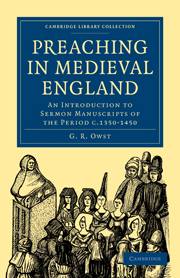Book contents
- Frontmatter
- GENERAL PREFACE
- AUTHOR'S PREFACE
- Contents
- ILLUSTRATIONS
- PART ONE THE PREACHERS
- PART TWO THE PREACHING SCENE
- PART THREE THE SERMONS
- CHAP. VI THE SERMON LITERATURE AND ITS TYPES
- CHAP. VII MANUALS AND TREATISES
- CHAP. VIII SERMON-MAKING, OR THE THEORY AND PRACTICE OF SACRED ELOQUENCE
- APPENDICES
- INDEX
- Plate section
CHAP. VI - THE SERMON LITERATURE AND ITS TYPES
Published online by Cambridge University Press: 07 September 2010
- Frontmatter
- GENERAL PREFACE
- AUTHOR'S PREFACE
- Contents
- ILLUSTRATIONS
- PART ONE THE PREACHERS
- PART TWO THE PREACHING SCENE
- PART THREE THE SERMONS
- CHAP. VI THE SERMON LITERATURE AND ITS TYPES
- CHAP. VII MANUALS AND TREATISES
- CHAP. VIII SERMON-MAKING, OR THE THEORY AND PRACTICE OF SACRED ELOQUENCE
- APPENDICES
- INDEX
- Plate section
Summary
After the activities of the mediaeval preachers and their audiences have been considered, the next task is to sort out and arrange the heterogeneous mass of special literature created to help them. That this is not so easy as might appear, the often arbitrary classifications of Mr J. E. Wells in his useful manual of Middle-English works, or some editors' extravagances in their prefaces to texts, can testify. Too often the cry of originality has been raised over a phrase or a preacher which would have been checked by any careful survey of this muchdespised class of writings. Even for so short a period as that chosen out for our particular study of the subject, there will have to be considered under the heading of sermon material much that might justly seem irrelevant at first sight. Beside the obvious variety in language and in the object of address already suggested in previous chapters, we shall have sermons reported at the time of delivery, sermons systematically collected and re-edited afterwards, sermons in skeleton for later amplification, expanded sermons, both in prose and verse, arranged to be read aloud in their entirety. But apart from all this there are numerous treatises and manuals to be dealt with, now a veritable encyclopaedia of the art, now the simplest outline of the lay-folk's faith roughly cast into didactic form, now a mere collection of moralized stories, or an index of themes. In external appearance alone, contrasts are not wanting.
- Type
- Chapter
- Information
- Preaching in Medieval EnglandAn Introduction to Sermon Manuscripts of the Period c.1350–1450, pp. 222 - 278Publisher: Cambridge University PressPrint publication year: 2010First published in: 1926



